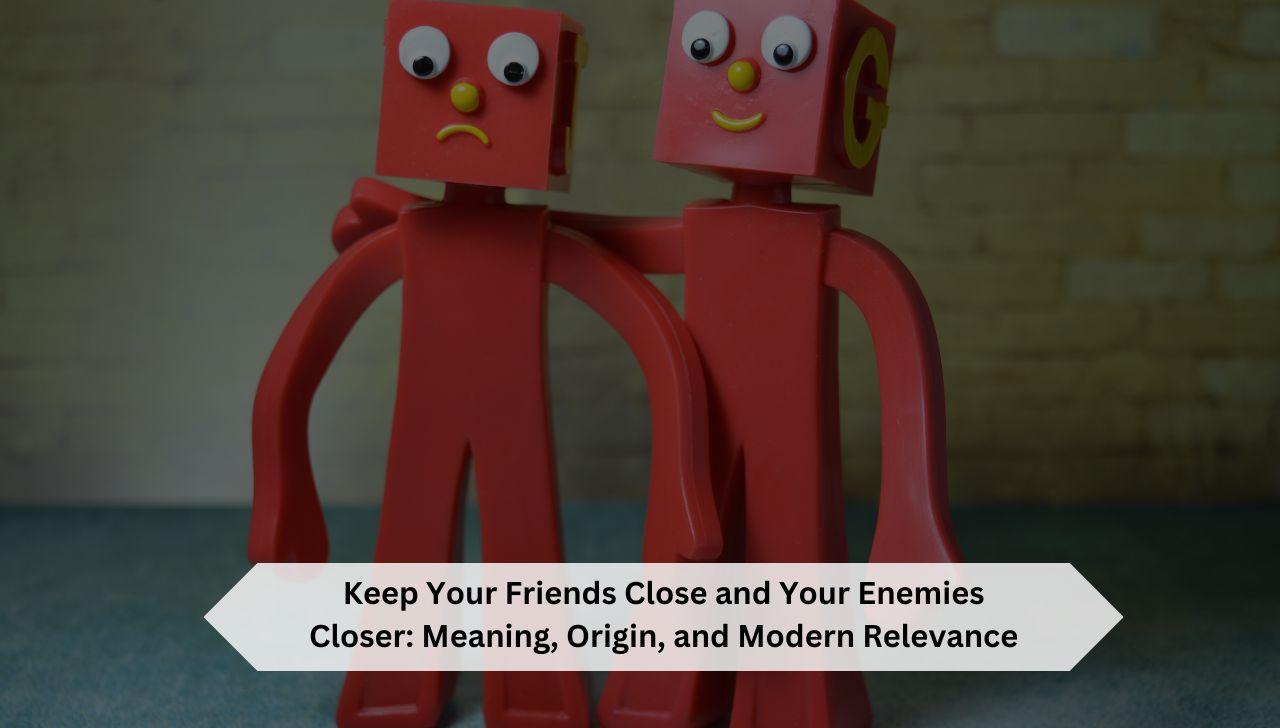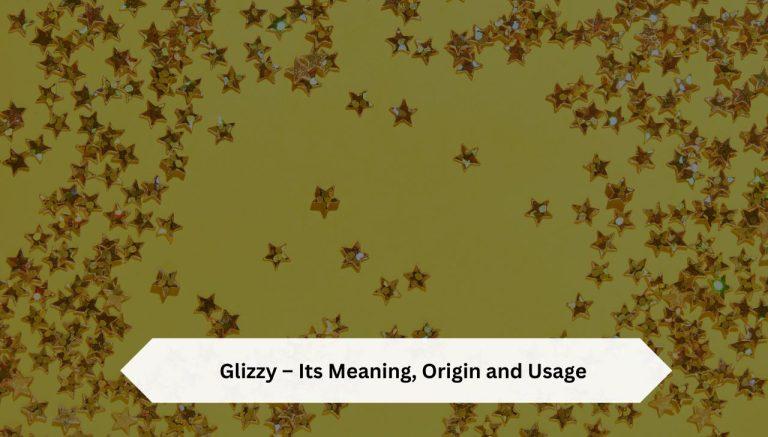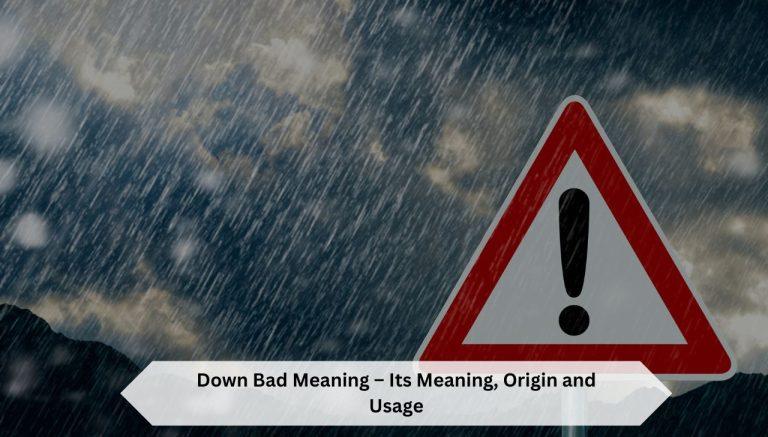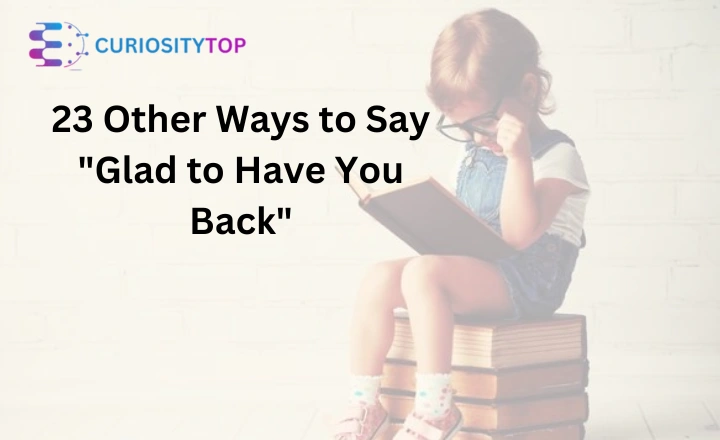Keep Your Friends Close and Your Enemies Closer: Meaning, Origin, and Modern Relevance
The saying “Keep your friends close, but your enemies closer,” is all about being intelligent and staying alert. It means you should oversee your rivals. It’s not just about keeping friends; it’s more about keeping tabs on those who might harm you. Being close to your enemies isn’t about liking them. It’s about protecting yourself, making sure you’re not caught off guard. This idea is about being on your toes, knowing what your enemies are up to. This can help you more than just having allies. It’s useful both in personal situations and bigger plans.
What Does “Keep Your Friends Close and Your Enemies Closer” Mean?
The saying “Keep your friends close and your enemies closer” means you should be smart about handling relationships, especially with those who might threaten you. It suggests that it’s good to stay close to your friends, but it’s even more crucial to keep a close eye on your enemies. The main idea here is to know what your enemies are up to.
By watching them closely, you can understand their motives and what they’re planning. This knowledge can give you an edge, helping you stay one step ahead. This tactic is often used in war and politics, where knowing what the other side thinks can be just as important as strength.
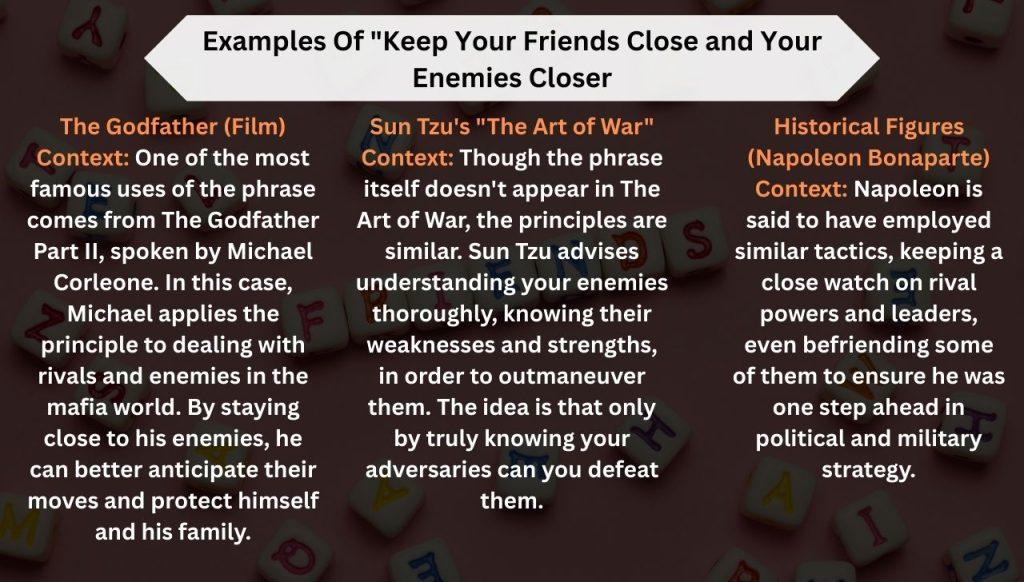
Examples Of “Keep Your Friends Close and Your Enemies Closer
The phrase “Keep your friends close, but your enemies closer” suggests that it’s strategic to understand and monitor your enemies just as much, if not more, than your friends. It has been used in various contexts, including literature, movies, and history. Here are some examples where this phrase or its spirit has been applied:
1. The Godfather (Film)
- Context: One of the most famous uses of the phrase comes from The Godfather Part II, spoken by Michael Corleone. In this case, Michael applies the principle to dealing with rivals and enemies in the mafia world. By staying close to his enemies, he can better anticipate their moves and protect himself and his family.
Quote: “Keep your friends close, but your enemies closer.” – Michael Corleone
2. Sun Tzu’s “The Art of War”
- Context: Though the phrase itself doesn’t appear in The Art of War, the principles are similar. Sun Tzu advises understanding your enemies thoroughly, knowing their weaknesses and strengths, in order to outmaneuver them. The idea is that only by truly knowing your adversaries can you defeat them.
Quote: “Know your enemy and know yourself, and in a hundred battles, you will never be in peril.”
3. Historical Figures (Napoleon Bonaparte)
- Context: Napoleon is said to have employed similar tactics, keeping a close watch on rival powers and leaders, even befriending some of them to ensure he was one step ahead in political and military strategy.
Example: Napoleon’s political alliances and strategic positioning often involved keeping a watchful eye on potential enemies while appearing to maintain friendly relations.
4. Business and Politics
- Context: In the world of business and politics, the phrase is often applied when dealing with competitors. By observing their strategies, weaknesses, and movements, one can gain a competitive advantage. Many politicians and business leaders have built careers by staying close to their adversaries while subtly undermining them.
Example: A business executive may form alliances with competitors but subtly ensure they stay ahead by knowing their competitors’ next moves.
5. Friendships and Rivalries
- Context: In everyday life, people may use the phrase when dealing with personal rivalries or friendships. The idea is that you should maintain a sense of closeness to your rivals to understand their motivations and strategies, giving you the upper hand in any confrontation.
Example: In a workplace, two colleagues may be friendly, but if one is vying for a promotion, the other may stay close to observe their tactics and behaviors, ensuring they remain competitive.
6. Strategic War and Diplomacy
- Context: On a diplomatic level, nations sometimes form strategic alliances with their enemies to monitor each other closely. These alliances can help prevent unexpected attacks or shifts in political dynamics. The U.S. and the Soviet Union during the Cold War, despite being adversaries, kept diplomatic channels open to better understand each other’s strategies and intentions.
Also Read – Lords Prayer in Old English: Translation, History, and Meaning Explained
Origin of the Phrase: From Sun Tzu to Pop Culture
The phrase “Keep your friends close and your enemies closer” isn’t clearly from Sun Tzu, even though it sounds like something he’d say.
It got famous from “The Godfather Part II,” a book by Mario Puzo, and later a movie. Michael Corleone uses this line in the story, which sticks with people. Since then, it’s been everywhere, from film to everyday chats. It’s one of those lines that feels old but started in the 1970s.
Why This Strategy Is Still Used in Politics, Business, and Life
After looking into its history and impact, it’s clear that the saying “Keep your friends close and your enemies closer” is still helpful in areas like politics, business, and personal life. In politics, this method helps leaders keep an eye on their opponents, which can help stop threats or defeats. Companies use this strategy in business to keep up with competitors’ actions. This allows them stay ahead.
In personal relationships, knowing how to handle challenging behaviors can prevent arguments and improve how we manage our interactions with others. This strategy’s lasting importance shows the importance of staying alert and managing relationships wisely for stability and success.
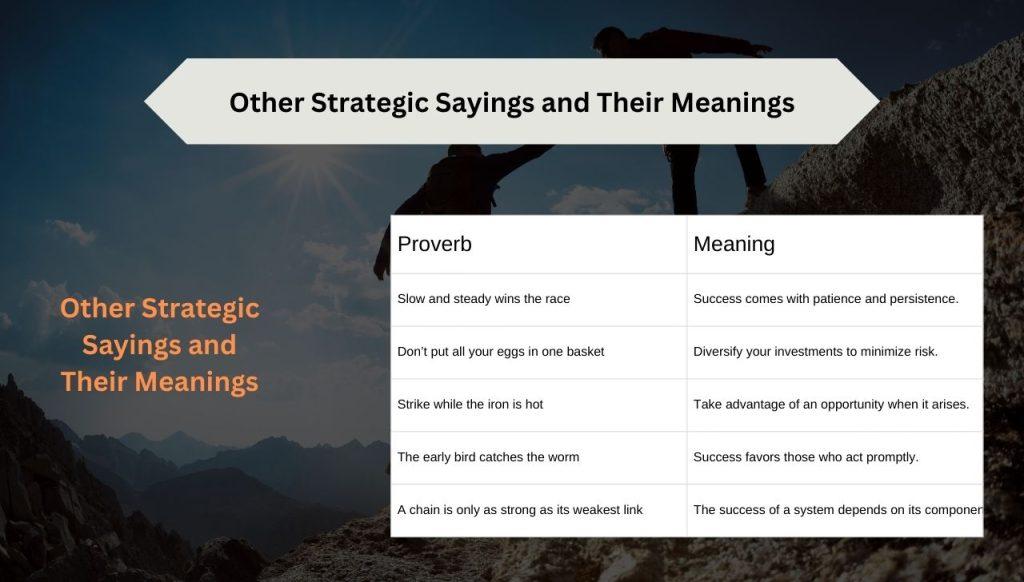
Other Strategic Sayings and Their Meanings
Strategic sayings come from years of wisdom and help us make wise choices. For example, “A stitch in time saves nine” tells us it’s better to solve a problem immediately to avoid bigger issues later. Then there’s “Do not count your chickens before they hatch.” It reminds us to wait for actual results before making plans; it’s all about being practical and patient.
| Proverb | Meaning |
|---|---|
| Slow and steady wins the race | Success comes with patience and persistence. |
| Don’t put all your eggs in one basket | Diversify your investments to minimize risk. |
| Strike while the iron is hot | Take advantage of an opportunity when it arises. |
| The early bird catches the worm | Success favors those who act promptly. |
| A chain is only as strong as its weakest link | The success of a system depends on its components. |
| A bird in the hand is worth two in the bush | It’s better to hold onto something certain than risk it for something uncertain. |
| Don’t burn bridges | Avoid damaging relationships that may benefit you later. |
| You can’t make an omelette without breaking eggs | Sacrifices are necessary for progress. |
| Keep your friends close, but your enemies closer | Understanding your adversaries gives you the advantage. |
| Don’t count your chickens before they hatch | Don’t assume an outcome before it’s certain. |
| When the going gets tough, the tough get going | Resilience is key in difficult situations. |
| It’s not about the destination, but the journey | Focus on the process, not just the end goal. |
| Rome wasn’t built in a day | Big achievements require time and effort. |
| The pen is mightier than the sword | Communication and ideas are more powerful than force. |
| You miss 100% of the shots you don’t take | Taking risks is essential for success. |
| Fail fast, fail often | The quickest path to success is through learning from failures. |
| He who hesitates is lost | Delays can cause missed opportunities. |
| Fortune favors the bold | Risk-taking can lead to great rewards. |
| A fool with a tool is still a fool | Tools and resources are only valuable when used wisely. |
| Measure twice, cut once | Planning ahead leads to fewer mistakes. |
| Lead by example | A true leader influences others by setting the right behavior. |
| The devil is in the details | Small things often make the biggest difference. |
| The best defense is a good offense | Take proactive steps to manage risks. |
| Actions speak louder than words | What you do has more impact than what you say. |
| Know your enemy | Understanding your competition is crucial for success. |
Also, “Every cloud has a silver lining” is a way to stay hopeful. It means even in tough times, there’s something good. Sayings like “Keep your friends close and your enemies closer” give us straightforward advice. They help us handle relationships, business, and personal challenges smartly. These sayings are like quick tips for life, right? They cut through the noise and give us a clear direction when things get tricky.
Conclusion
The saying “Keep your friends close, but your enemies closer,” is about being smart in handling your relationships. It tells us to stay alert and keep a watchful eye on those who might not wish us well. This advice isn’t just old but gold, especially when you think about your friends and those who could be against you. It’s like being one step ahead, always ready, just in case. By keeping this in mind, you can deal with tricky situations better and avoid getting hurt by unexpected betrayals.

